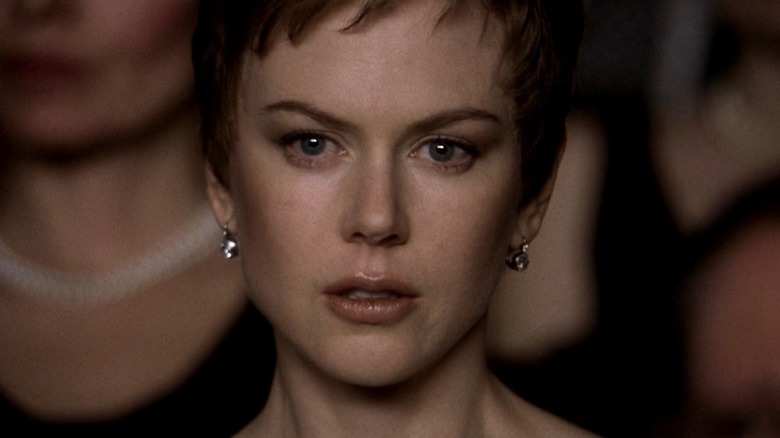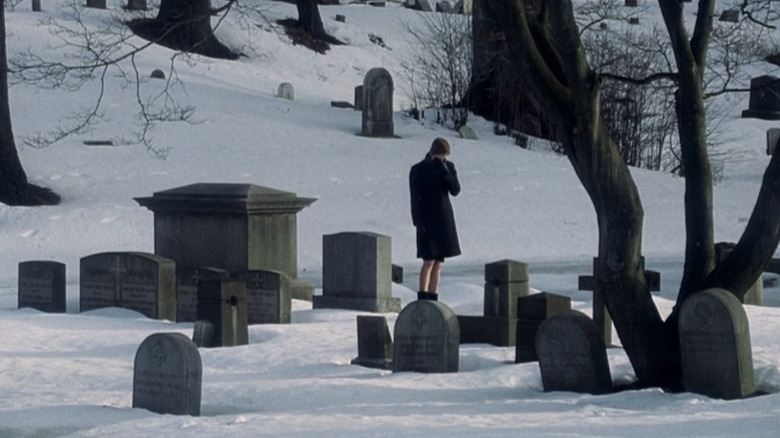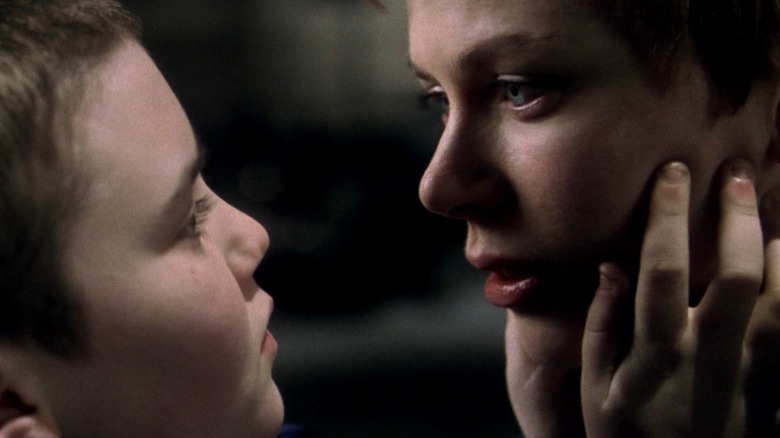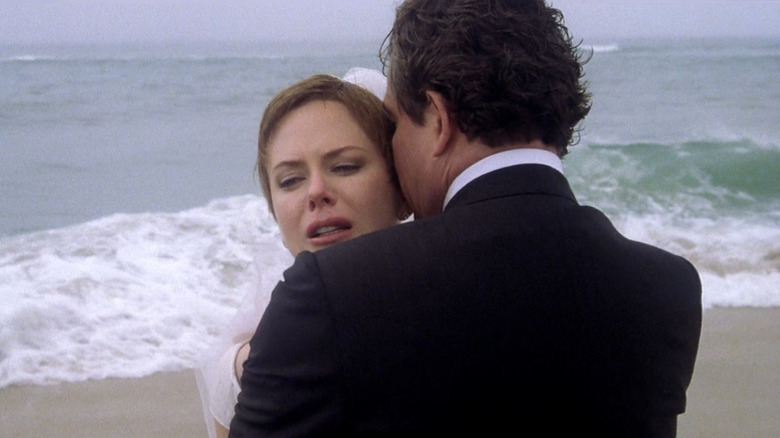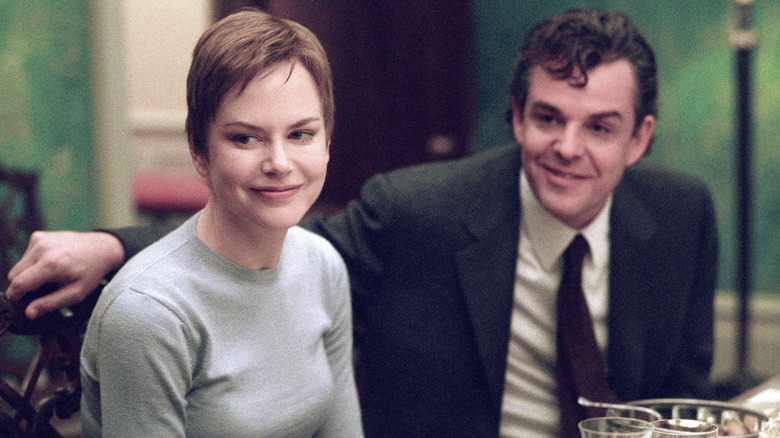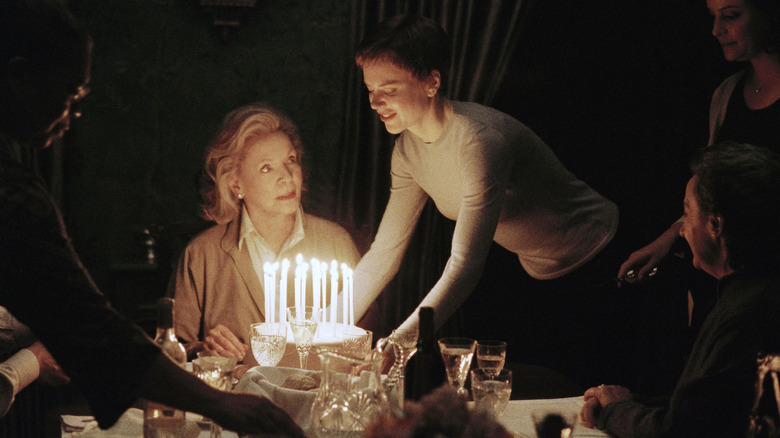The Ending Of Birth Explained
Directed by Jonathan Glazer, the 2004 mystery film "Birth" is one of Nicole Kidman's most memorable movies. The Australian star plays Anna, a widow who meets a 10-year-old boy (Cameron Bright) that claims to be her dead husband. Although Anna initially doesn't make much of the claim, the boy — who shares the same name as her husband, Sean — is insistent in his pursuit. He becomes more difficult to ignore after divulging intimate details about Anna and her extended family.
As you might assume, Anna's family members have a generally hostile attitude towards the child and his outlandish claims. Her mother Eleanor (Lauren Bacall) is outwardly combative and afraid the situation could escalate to something criminal. Meanwhile, other family members are also highly skeptical, including Anna's sister Laura (Alison Elliott), Laura's husband Bob (Arliss Howard), Sean's brother Clifford (Peter Stormare), and his wife Clara (Anne Heche).
Over time, Anna becomes convinced that the boy truly is the reincarnation of her husband and plans to leave her fiancé Joseph (Danny Huston) and run away with him to get married when he's of legal age. However, the truth is eventually revealed that young Sean is, in fact, not the reincarnation of Anna's deceased husband but just a confused individual living inside a fantasy. Admittedly, "Birth" is quite the upsetting drama, and if you need a bit of help processing the ending of this very disturbing movie, we're here to break down the final moments of "Birth."
Anna didn't really understand her real husband when he was alive
"Birth" never really gives the audience a strong impression of Anna's husband, Sean. We simply hear his voice and glimpse his silhouette jogging through Central Park before he collapses due to a fatal heart attack. Sean's minor presence in the film parallels his wife's ignorance of his true nature during their marriage. The only time he speaks is as a disembodied voiceover expressing his views about reincarnation, stating, "I'm a man of science. I just don't believe in that mumbo-jumbo."
This indicates his pragmatic outlook, which is in stark contrast to the kind of unwavering faith young Sean displays. If the boy truly is her husband and has memories of his past life, he would most likely dismiss them or seek out a logical explanation given his practical sensibilities. Instead, the youngster hounds the family with his claims, which is in opposition to the kind of reaction her husband's only statement in the film might imply.
Anna's blindness within her own marriage is further demonstrated with the revelation that Sean was having an affair with his sister-in-law, Clara, before he died. Clara confronts young Sean with this information and tells him, "If you had been Sean ... you would've come to me first." The fact that he didn't do so proves he isn't the real deal. This secret affair exemplifies that Anna's view of her marriage was a mirage, and young Sean's claims are just another illusion she is duped into believing.
Young Sean truly believes what he's claiming
Young Sean learns the personal details of Anna's life after finding discarded love letters she had written to her husband. Clara was given the letters by Sean and planned to gift them to Anna in order to shatter her delusional view about their marriage. But she changes her mind at the last moment and discards the letters, which young Sean then finds.
After reading the letters, the boy does genuinely think that he is in love with Anna and begins to believe that he must be her late husband. Although he is misleading the family about how he knows the intimate details of their lives, he justifies that it is simply a way to convince them of the truth.
Once Clara reveals the affair to young Sean, he is distraught because it proves to him that Sean didn't love Anna the way he does. The irony of the whole situation is that since the boy is genuine in his affection, that means he can't possibly be Anna's husband, who never truly loved her. Although he doesn't explain the whole situation to her, he does confess, "I'm not Sean because I love you."
Anna simply never moved on from Sean's death
Anna's reticence to move on from the death of her husband is hinted at numerous times. In the speech her fiancé Joseph gives at their engagement party, he recounts how she continuously turned him down for a date when they met and then describes her numerous rejections of his marriage proposal before finally conceding. Clearly, Anna does not love the new man in her life but is doing what she thinks is the proper thing to do. She even confesses to Clifford and Clara that she has been unable to move on, saying, "It's taken me this long, and I can't get him out of my system. I can't."
Young Sean is able to convince Anna that he's her husband not just because of what he knows, but because it's something they both desperately want to be true. They indulge in a shared fantasy where their love transcends all obstacles, including death. Young Sean's at an age — when things like Santa Claus and the Tooth Fairy seem completely plausible — where he has unwavering child-like faith in his beliefs. Anna's faith, however, comes from her desperate desire to reclaim the idyllic life she thinks she had. It's not the real Sean she can't let go of, but the version of him that she has created in her mind. Imaginary people rarely have any faults, so she clings to the specter of her perfect husband rather than accept someone real with their inevitable faults.
The last scene of the film is heartbreaking, as we watch Anna wade into the sea in anguish, still in her wedding gown after marrying Joseph but clearly unable to let go of Sean's memory.
Birth is about class differences
Class differences are a notable aspect of "Birth." Anna represents the values of elite, upper crust New York City society; she is caught between the rich (and grown-up) Joseph, who is of her socioeconomic class, and Sean, whose family is poor and without standing. This was also true of the original Sean, whose family came from much poorer circumstances than her own. It's also worth noting that the original Sean's life is driven by class issues. While he and Anna manage to build a marriage in spite of their differences, it's his cash-poor sister-in-law to whom he turns for an affair — although he refuses to leave Anna for her.
Meanwhile, young Sean's attempt at ruining Joseph and Anna's upcoming marriage could at least partially be built upon class jealousy; he's hungry for the good life that Anna represents and wants it so badly that he allows himself to be possessed — by the notion of being the older Sean. In a more cynical view, it may be why he targets Anna instead of Clara: she has money, Clara does not.
Sean and Anna meet and fall in love, in spite of their class differences, but Sean turns to a woman from his own class to have an affair with. A younger Sean — exposed to wealth for the first time — becomes so comfortable being a part of the elite, he's willing to lie to keep it all going. Power entraps them both in completely different ways.
What the cast and director have said about Birth
The film's actors definitely have unique ideas as to what the film represents. "It's a very gentle film, it's not about shocking and trying to exploit these things to be shocking. Its language is very deep," Nicole Kidman told IGN. The cast, crew and director were quite aware that the movie's subject matter was controversial, but felt that the way the movie accomplished that story was tasteful and restrained. After all, it's a love story between a little boy who passionately believes he's the reincarnation of a grown woman's dead husband, and her wavering emotions about that love.
While some might see the film as a treatise on reincarnation, the director approaches the subject from a different point of view. "We aimed to make something robust in which every question leads to another," Jonathan Glazer told Maureen Foster (via Slashfilm) for her book "Alien in the Mirror." "I'm not a Buddhist and I don't believe in reincarnation; I don't think I could do a film about it if I did. I was more interested in the idea of eternal love. I wanted to make a mystery, the mystery of the heart." Call it an unusual love story, call it an unsettling study of the needs of the human heart, but decades after it was released, "Birth" and its enigmas are still compelling.
